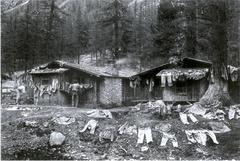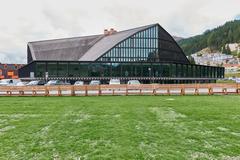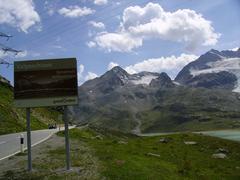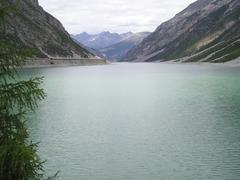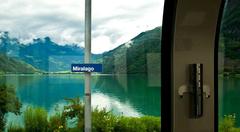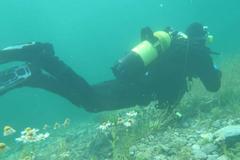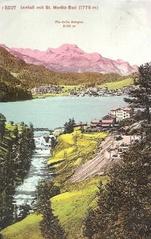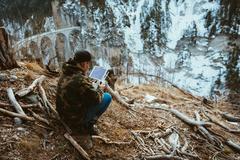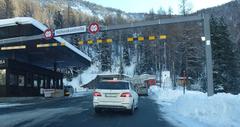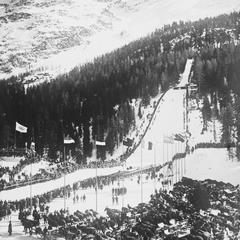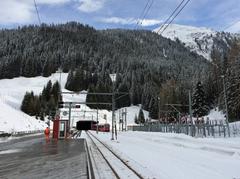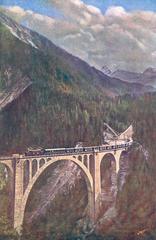Badrutt’s Palace Hotel: Complete Visiting Guide, Hours, Tickets, and Historical Insights
Date: 04/07/2025
Introduction
Nestled amid the majestic Swiss Alps in St. Moritz, Badrutt’s Palace Hotel stands as a beacon of luxury, heritage, and architectural splendor. Since its establishment in 1896 by Caspar Badrutt, the hotel has been pivotal in defining winter tourism and setting global standards for hospitality excellence (Badrutt’s Palace Official History). The Neo-Gothic masterpiece, set against the tranquil Lake St. Moritz, has hosted royalty, celebrities, and discerning travelers for over a century, weaving itself into the very fabric of the Engadin Valley’s cultural history (Excellence Magazine; manorcastles.com).
Modern expansions like the 2025 Serlas Wing, with its sustainable design and craftsmanship, reaffirm Badrutt’s Palace’s commitment to blending tradition with contemporary luxury (Forbes; ACPV Architects). The property is renowned for world-class amenities, Michelin-starred dining, exceptional wellness offerings, and year-round alpine activities (luxuryguideusa.com; booking.com).
This guide provides detailed visitor information on hours, ticketing, accessibility, travel tips, and highlights of nearby historical attractions, ensuring a seamless and enriching experience at one of Switzerland’s most iconic hotels (MySwitzerland St. Moritz; Condé Nast Traveler).
Table of Contents
- Origins and Founding Vision
- Architectural Significance and Evolution
- Notable Events and Legendary Guests
- Role in Luxury Tourism
- Practical Visitor Information
- Setting and Atmosphere
- Accommodations and Amenities
- Gastronomy and Dining Experiences
- Activities and Experiences
- Service and Hospitality
- Sustainability and Responsible Luxury
- Nearby Historical Sites and Attractions
- Practical Tips for Travelers
- Frequently Asked Questions (FAQs)
- Visual and Media Resources
- References
Origins and Founding Vision
The legacy of Badrutt’s Palace traces to Johannes Badrutt, who in 1856 acquired the Pension Faller and transformed it into the Engadiner Kulm, igniting the concept of winter tourism in St. Moritz (Munich Mountain Rebel; Petra Gut). His famous wager with English guests on the joys of the Engadin winter sun led to the region’s emergence as a premier alpine destination (Badrutt’s Palace Official History).
Caspar Badrutt expanded this vision by acquiring and renovating the Hotel Beau Rivage in 1884, reopening it in 1896 as Badrutt’s Palace Hotel. The property set new standards for grandeur and hospitality, with a design inspired by romantic chateaux and the aesthetic ideals of the Belle Époque (Les Grandes Tables de Suisse).
Architectural Significance and Evolution
Badrutt’s Palace is a landmark of Neo-Gothic architecture, with its imposing tower, grand halls, and intricate façades that harmonize with the Alpine backdrop (Petra Gut). Each expansion has balanced historical preservation with innovation. The 2025 Serlas Wing, designed by Antonio Citterio and Patricia Viel, features sustainable materials like Dorato Valmalenco stone and local oak, a striking cantilevered roof using the yakisugi technique, and interiors by Loro Piana that blend contemporary luxury with Alpine tradition (Forbes; ACPV Architects).
Notable Events and Legendary Guests
The Palace’s guestbook includes icons such as Coco Chanel, Alfred Hitchcock, Marlene Dietrich, and Winston Churchill (Excellence Magazine; The Zoe Report). Hitchcock’s stays famously inspired his film “The Birds.” The hotel’s social calendar features longstanding events like the Palace Balls, the annual Christmas Tree Auction for charity, and the world’s first snow polo tournament (Les Grandes Tables de Suisse; Excellence Magazine).
Role in Luxury Tourism
Badrutt’s Palace catalyzed the transformation of St. Moritz into an elite winter and summer resort, pioneering luxury experiences from après-ski culture to fine dining (Petra Gut). The hotel set standards with its lavish amenities, attentive service, and role in shaping the Engadin’s identity as a global destination (Excellence Magazine).
Practical Visitor Information
Visiting Hours
- Hotel Facilities: Open year-round. Main areas including restaurants and bars operate daily, typically from 7:00 AM to 11:00 PM.
- Spa & Wellness: Hours vary by season; check the official website or contact the hotel for details.
Tickets and Booking
- Overnight Stays: Reservations required; book early during peak seasons.
- Dining & Events: Non-guests can reserve restaurants and certain events; booking in advance is strongly recommended.
Accessibility
- Physical Access: Wheelchair-friendly entrances, elevators, and adapted rooms are available. Notify the hotel of any special requirements at booking.
- Assistance: Multilingual staff and assistive technologies are provided (Condé Nast Traveler, LetsGoMyLove).
Travel Tips
- Getting There: Easily accessible by train (Glacier Express, Bernina Express) and car from Zurich or Milan; Samedan Airport is closest.
- Local Transport: Hotel shuttle, electric vehicle rentals, and extensive public transport options are available.
Setting and Atmosphere
Perched 1,800 meters above sea level, Badrutt’s Palace commands breathtaking views of Lake St. Moritz and the Alps. The ambiance is a blend of Belle Époque elegance and modern comfort, with every room offering striking vistas and the service widely acclaimed for its warmth and attentiveness (manorcastles.com).
Accommodations and Amenities
- Rooms & Suites: 157 rooms (including 37 suites) with marble bathrooms, luxury amenities, and free Wi-Fi. Suites feature butler service (booking.com; luxuryguideusa.com).
- Wellness: Indoor pool with alpine views, spa with eco-conscious treatments, fitness center, and seasonal tennis court/ice rink.
- Family-Friendly: Children’s programs and family services are available.
Gastronomy and Dining Experiences
- On-Site Dining: Six restaurants, including Le Restaurant, Le Relais, La Diala, and IGNIV by Michelin-starred chef Andreas Caminada (manorcastles.com).
- Local Cuisine: Focus on seasonal, locally sourced ingredients and a robust wine cellar.
- Nearby Options: Easy access to other Michelin-starred venues in St. Moritz (guide.michelin.com).
Activities and Experiences
Winter Sports
Access to 350 km of ski pistes, complimentary shuttle to Corvatsch cable car, ice skating, and a ski concierge (booking.com; luxuryguideusa.com).
Summer Pursuits
Hiking, mountain biking, golf, whitewater rafting, and tennis are among summer offerings (luxuryguideusa.com).
Cultural Exploration
Proximity to the Segantini Museum, Engadin Museum, historic churches, and art galleries (luxuryguideusa.com).
Service and Hospitality
The hotel is renowned for its high staff-to-guest ratio, 24-hour reception, valet parking, shuttle service, and personalized concierge (booking.com). Member of Leading Hotels of the World and Swiss Historic Hotels.
Sustainability and Responsible Luxury
Environmental Stewardship
Energy-efficient systems, LED lighting, water-saving fixtures, and local materials are core to operations. Renovations prioritize eco-conscious design (Condé Nast Traveler).
Sustainable Sourcing
Culinary teams favor organic, seasonal, and local products, supporting Engadin farmers and artisans (Hotels Above Par).
Spa and Wellness
Eco-friendly spa products and water recycling systems are standard (Dr Burgener).
Community Engagement
Active support for local charities through the Badrutt’s Palace Foundation, with initiatives like the annual Christmas Tree Auction (Tower Revue).
Waste Reduction
Minimization of single-use plastics, composting, and circular economy practices (Dr Burgener).
Guest Engagement
Guests are encouraged to participate in sustainability initiatives, such as energy conservation and supporting local businesses (Badrutt’s Palace).
Nearby Historical Sites and Attractions
- Segantini Museum: Alpine art.
- Engadin Museum: Regional history.
- Leaning Tower of St. Moritz: Landmark architecture.
- Historic Churches: Tour local chapels and heritage sites.
Practical Tips for Travelers
- Best Time to Visit: Ski season (winter) or hiking/cultural festivals (summer).
- Reservations: Essential for rooms, dining, and spa in peak seasons.
- Transportation: Use public transport or hotel shuttles for sustainability.
- Dress Code: Smart casual attire is recommended in restaurants and public areas.
Frequently Asked Questions (FAQs)
Q: Can I visit Badrutt’s Palace without staying overnight?
A: Yes, restaurants, bars, and certain public areas are open to non-guests; reservations are strongly advised.
Q: Are guided tours available?
A: Occasionally, and by appointment; contact the concierge for availability.
Q: Is the hotel accessible for guests with disabilities?
A: Yes, the property provides step-free access, adapted rooms, and assistive technologies.
Q: Are there eco-friendly initiatives at the hotel?
A: Yes, from energy efficiency to sustainable sourcing, waste reduction, and community engagement.
Q: What are nearby historical attractions?
A: Segantini Museum, Engadin Museum, and historic churches are all within easy reach.
Visual and Media Resources
- Exterior and interior images: “Badrutt’s Palace Hotel Neo-Gothic façade,” “Serlas Wing luxury suite interior,” “Vintage Palace Balls at Badrutt’s Palace Hotel.”
- Interactive content: Map of Badrutt’s Palace and nearby attractions, virtual tours via the official website.
References
- Badrutt’s Palace Official History
- Forbes
- ACPV Architects
- Excellence Magazine
- manorcastles.com
- luxuryguideusa.com
- booking.com
- Condé Nast Traveler
- Dr Burgener
- Tower Revue
- MySwitzerland St. Moritz
- Hotels Above Par
- LetsGoMyLove
- guide.michelin.com
- Badrutt’s Palace
Plan Your Visit
To make the most of your Swiss Alpine experience:
- Reserve your stay, dining, or spa appointments in advance.
- Download the Audiala app for up-to-date information and exclusive offers.
- Explore related articles for more on St. Moritz’s historical sites and sustainable travel.
- Follow Badrutt’s Palace and St. Moritz tourism on social media for the latest updates.
Badrutt’s Palace Hotel is more than a luxurious escape—it’s a living testament to Swiss heritage, innovation, and the evolving standards of responsible luxury.
